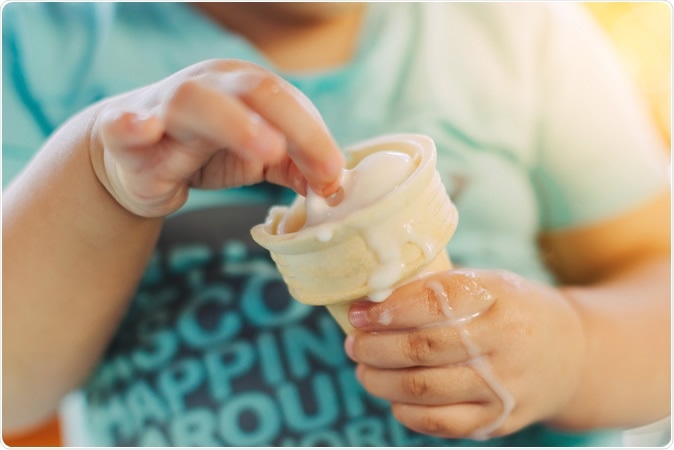
Childhood obesity. Image Credit: Natee K Jindakum / Shutterstock
Childhood obesity is on the rise and has been increasing over several decades. The World Health Organization (WHO) now puts it among the leading issues in public health this century. Some studies have estimated that there are over 42 million children under five years who are obese, the world over, with about 35 million of them living in low- or middle-income countries.
Earlier research has shown that obese children are at higher risk of dying earlier from the time they are middle-aged onwards compared to the population at large. Psychologically too, such individuals are at higher risk. Childhood obesity can cause a decline in the self-esteem and emotional well being of the child.
Children who are obese are likely to develop into obese adults and to develop diabetes and cardiovascular disease earlier than otherwise expected. The factors that contribute to the development of obesity include environmental cues, lifestyle habits gained from the caregivers, an increase in the intake of energy-dense foods including soft drinks, sweetened juices, larger portion sizes, and a lack of physical exercise.
The research shows that childhood obesity is associated with diabetes, liver disease, and hypertension, or high blood pressure, all of which are linked, in turn, to an increased risk of death and sickness. Also, such children are often targeted and bullied or discriminated against, which could cause mental disorders. Future research should target the mechanistic or causal relationship, showing if and how these linkages are essential.
The current studies were aimed at detecting any additional risk of premature death in early adult life associated with obesity in childhood, and to find out the association of this condition with anxiety and depression.
Study 1
The first study looked at about 7,000 people who had been treated for obesity at least once between the ages of 3 and 17 years. The control group consisted of about 34,000 people who were approximately the same age, gender, and lived in the same area.
During the follow-up period, lasting about 3.6 years, on average, 39 people or 0.55% of the group, which had a history of obesity in childhood, died. On the other hand, 65 individuals (which comes to 0.19%) of 34 000 died. Shockingly, most of them were young – the average age at the time of death was about 22 years.
The researchers looked at why there was a dramatic increase in early adult death. Explains researcher Emilia Hagman, “Our study shows that children with obesity have a significantly higher risk of premature mortality already as young adults. Both the risk of death from somatic diseases, of which more than a quarter were directly related to obesity, and the risk of suicide were increased for this group. We did not, however, see an increased risk of mortality from injuries or external causes such as criminal acts.”
Study 2
The same group of researchers also published another study, this time in the BMC Medicine, where they showed a 43% higher risk of anxiety and/or depression in girls with obesity, and 33% higher in obese boys, compared with non-obese girls and boys respectively. This study included over 12 000 children aged 6-17 years of age, who had been treated at some point for obesity. The control group included 60 000 children from the population at large.
The researchers used statistical tools to account for the presence of other factors that affect the risk for anxiety, depression, and early death. These include a Nordic background, the presence of neurological or psychiatric disease, and a family history for anxiety or depression, and the child’s social and economic background. After adjusting for all these factors, the same linkages were seen between obesity and negative emotional states.
Implications
Researcher Louise Lindberg says, “Taken together our studies highlight the vulnerable situation that children with obesity are in. Anxiety and depression cause emotional and physiological stress and suffering and may also hinder obesity treatment. It is important that children with obesity are offered adequate and long-term treatment early in life to reduce these risks. It is deeply unethical that children with obesity do not receive any form of treatment in some regions in Sweden.”
Along with earlier studies, the results of these current research efforts also support the role of enforcing and encouraging healthy lifestyle choices at home, including food choices. This knowledge, if consistently and lovingly offered, will pay off in long-term healthy habits. Meanwhile, dietary and exercise interventions can be combined creatively on a community basis to prevent obesity in children.
Journal references:
- ”Association of childhood obesity with risk of early all-cause and cause-specific mortality: A Swedish prospective cohort study.” Louise Lindberg, Pernilla Danielsson, Martina Persson, Claude Marcus, Emilia Hagman, PLOS Medicine, online 18 mars, 2020, doi: 10.1371/journal.pmed.1003078
- “Anxiety and depression in children and adolescents with obesity: a nationwide study in Sweden,” Louise Lindberg, Emilia Hagman, Pernilla Danielsson, Claude Marcus, Martina Persson, BMC Medicine, online 21 februari, 2020, doi: 10.1186/s12916-020-1498-z